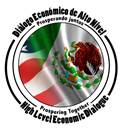 News and Events
News and Events
 HLED Fact Sheet (12/08/16)
HLED Fact Sheet (12/08/16)
 HLED Joint Declaration
HLED Joint Declaration
 Secretary Pritzker's HLED
Secretary Pritzker's HLED
Op-Ed HLED Fact Sheet
HLED Fact Sheet HLED Joint Statement
HLED Joint Statement Initiative Fact Sheets
Initiative Fact Sheets Progress Report on the
Progress Report on the
U.S.-Mexico High Level
Economic Dialogue U.S.-Mexico 21st Century
U.S.-Mexico 21st Century
Border Management Process Updated HLED Fact Sheet
Updated HLED Fact Sheet Secretary Pritzker's HLED
Secretary Pritzker's HLED
Press Release Vice President Biden's HLED
Vice President Biden's HLED
Fact Sheet U.S.-Mexico Energy Business Council
U.S.-Mexico Energy Business Council Federal Register Notice
Federal Register Notice Click here to submit
Click here to submit
feedback to
hled@trade.gov
HIGH LEVEL ECONOMIC DIALOGUE - INITIATIVE FACT SHEETS
 |
Educational Exchange: Fact Sheet |
What is the Bilateral Forum?
The Bilateral Forum on Higher Education, Innovation and Research (FOBESII) announced by Presidents Obama and Peña Nieto in May, 2013 complements both countries' efforts to enhance educational opportunities as well as our economic goals under the HLED. FOBESII seeks to enhance economic and education opportunities for citizens of both countries and to promote a 21st Century labor force as well as mutual prosperity.
FOBESII complements President Obama's 100,000 Strong in the Americas initiative that seeks to enhance academic mobility in both directions between the United States and hemispheric countries including Mexico. It also complements the Mexican Government's Proyecta 100,000 initiative whose goal is to send 100,000 Mexican students to the United States and to bring 50,000 U.S. students to Mexico by the year 2018. This cooperation builds on the strong foundation of our binational support for the Fulbright-Garcia Robles program, which has been exchanging students, scholars, and teachers since 1948.
What We’ve Done
Between January and June 2014 six binational working groups met with the participation of 450 academic, civil society and private sector representatives of both countries to identify potential academic and scientific areas of cooperation, as well as best practices and obstacles for enhanced interaction. Our governments are working with partners on both sides of the border to implement the recommendations of these working groups, focusing on four major items: academic exchange, learning the other country's language, labor force development, and joint research and innovation.
Working together with the relevant support of academic and private sectors, both governments, have facilitated sending more than 27,000 Mexican students and teachers to the United States in 2014 for education and training. Enhanced interaction among important local and state governments as well as among higher education institutions have resulted in 23 new agreements and the reinforcing of existing agreements between educational institutions.
Along with Banco Santander and Universia, its nonprofit wing, the U.S. and Mexican governments launched the binational academic mobility website ‘Mobilitas’ (http://mobilitasedu.net/) as a result of the commitments reached through FOBESII's working groups. The website will offer students from both countries relevant information on higher-learning institutions, their academic programs and scholarships. The website's address is: http://mobilitasedu.net/
The U.S. government also supports a network of 18 EducationUSA advising centers in Mexico (http://educationusa.state.gov) to provide comprehensive and current information about how to apply to U.S. colleges and universities.
The U.S. and Mexican governments are also working together to encourage more students from diverse backgrounds to participate in exchanges. The United States is re-opening the Gilman program for U.S. study abroad in parts of Mexico that are not subject to a travel warning. EducationUSA Opportunity Funds are also helping more Mexican students from diverse backgrounds access U.S. higher education. Recognizing the importance of language learning, the United States is also helping to strengthen and expand English language teaching and learning in Mexico. The English Access Microscholarship program has provided more than 600 economically disadvantaged 13- to 20-year-old students with two years of after-school English language classes. In cooperation with the Mexican Ministry of Education, three English Language Fellows have worked as language teachers and teacher trainers in Mexican higher education institutions. More than 1,800 English teachers from Mexico have participated in distance learning programs, webinars and massive open online courses, known as MOOCs, to learn new teaching methodology.
With the HLED, we prosper together.

The International Trade Administration, U.S. Department of Commerce, manages this global trade site to provide access to ITA information on promoting trade and investment, strengthening the competitiveness of U.S. industry, and ensuring fair trade and compliance with trade laws and agreements. External links to other Internet sites should not be construed as an endorsement of the views or privacy policies contained therein. This site contains PDF documents. A PDF reader is available from Adobe Systems Incorporated.
